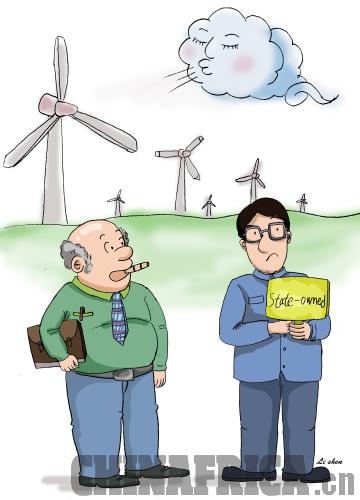| 
Recently, northeast China's Heilongjiang Province issued a new draft regulation stipulating that energy companies must get a license before they exploit solar and wind energy resources and that the energy they produce from these resources are state-owned. Those who fail to comply would be fined up to 100,000 yuan ($15,700). The regulation is said to have been enacted in accordance with Article Nine of China's Constitution.
Aimed at regulating energy companies that invest in solar and wind energy fields, the regulation is to respond to the random exploitation of resources in recent years, according to Wang Yunqi, Deputy Director of Legislative Affairs Commission of Heilongjiang Provincial People's Congress.
As soon as it was released, the regulation stirred widespread controversy. Supporters maintain that clarifying the ownership of wind and solar energy resources would safeguard the national security and foster better usage of these climate resources. However, others argue that there is no legal basis for the regulation and that it was an attempt to impose resource taxes on wind and solar energy usage.
FOR
Jiang Qifan
Law expert
The regulation is forward-thinking and strategically significant in terms of safeguarding the national security and promoting economic development.
If climate-related surveys can be conducted by anyone without government approval, then all kinds of companies, no matter their scale, qualifications or nature, could collect information on China's climate and environment at their own will, at any time and in any place. Some would even probe into military surroundings, recording and analyzing natural data for purposes beyond commercial ones. All of these may bring prospective threats to the national security. In this sense, the regulation is necessary.
In addition, with assessment and examination on the enterprises' qualification and detection purposes, local authorities could better arrange time and location for detecting climate resources, and improve the efficiency of the exploitation.
Meng Xiangan
Deputy Director of China Renewable Energy Society
The regulation conforms to the Constitution which stipulates, "All mineral resources, waters, forests, mountains, grasslands, unreclaimed land, beaches and other natural resources are owned by the state, that is, by the whole people." Therefore, energies exploited from these resources are also state-owned.
Wind and solar energy resources prescribed in the regulation refer to those exclusive to China's territorial land, airspace and seas. So, it is necessary to regulate the exploitation of resources in China's territory, otherwise anyone could come to China and develop natural resources here. Also, wind and solar energies here could also be used for commercial purposes.
Unlike the netizens' understanding, people needn't pay any fee for breathing or walking on land owned by the state, but when you buy houses built on the land, you have to pay for them.
Moreover, in the past, enterprises raced to occupy advantageous properties when setting up wind farms or photovoltaic plants, leading to redundant construction and a waste of resources. Asking companies to apply for a license before exploration will solve this problem and avoid excessive exploitation of wind and solar energy, fostering sound development in this industry.
Rufu
Blog.sina.com.cn
This regulation can be seen as supplmenet to the current law as it specifies that natural resources include energies from wind, sun, rain and air. Categorizing wind and solar energy resources as state-owned does not contradict people's right to enjoy natural resources like breathing fresh air or basking in the sun. Please ask yourself, do you have to pay for standing or walking on the road even though the land is owned by the state? Therefore, getting concerned about charging for breathing air is over-worrying.
While enjoying rights, one has to fulfill their obligations. Claiming the ownership of climate resources suggests that the state has to shoulder the responsibility of protecting and managing them. For example, the state has to relieve and help people in disaster-stricken areas when typhoons, hurricanes or floods happen.
|